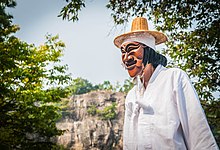| Baekjeong | |
 A masked person acting as a baekjeong butcher in a play | |
| Korean name | |
|---|---|
| Hangul | 백정 |
| Hanja | |
| Revised Romanization | Baekjeong |
| McCune–Reischauer | Paekchŏng |
The baekjeong (Korean: 백정) were an untouchable caste in Korea,[1] originating from some minority, nomadic groups of disputed ethnicity.
In the early part of the Goryeo period (918–1392), these minorities were largely settled in fixed communities.[1] However, the Mongol invasion left Korea in disarray and anomie and these groups became nomadic.[1] Subgroups of the baekjeong included the chaein (才人 "entertainers") and the hwachae (禾尺) or suchae (水尺),[2] who were primarily butchers. The baekjeong occupied specific professions like butchery, tanning, basket weaving and performing executions.[1]
During the Goryeo period, "baekjeong" was used as a neutral term to refer to the common people.[3] From the time of the Joseon dynasty, it became an insulting title used to refer to the lowest class of society.[4] In addition, since the Joseon dynasty, "baekjeong" has been also used to denigrate a person.[5][6] In contemporary South Korea, the term is mainly associated with the meaning of a butcher and even used in the restaurants' names.[7][8]
- ^ a b c d Sudrania, OP (9 September 2012). "Castes in a Global Perspective - Is Caste Only a Hindu Problem? (Part 6) - ChakraNews.com". ChakraNews.com. Retrieved 5 May 2018.
- ^ "화척(禾尺)" [Hwacheok (禾尺) - The Encyclopedia of Korean National Culture]. Encyclopedia of Korean Culture (in Korean). Retrieved 13 September 2021.
- ^ "Baekjeong(白丁) - Korean National Culture Encyclopedia". Encyclopedia of Korean Culture (in Korean). Retrieved 14 April 2018.
- ^ "National Korean Language Institute - Standard Language Encyclopedia". stdweb2.korean.go.kr. Archived from the original on 20 May 2018. Retrieved 14 April 2018.
- ^ "Prosecutors alleged the lobby to finish checking two people indicted without detention ... 'anticlimax'" (in Korean). 18 April 2018. Retrieved 28 April 2018.
- ^ Lee, Jung Geun (25 October 2011). "Human Baekjeong, criticism of Sejo of Joseon". Oh-My-News. Retrieved 28 April 2018.
- ^ "Kang Ho Dong BAEKJEONG". www.baekjeong.co.kr. Archived from the original on 16 June 2018. Retrieved 14 June 2018.
- ^ Yoon, Soon Yong (2011). "벽초『임꺽정』에 나타난 백정의 실체와 문학적 형상화" [The Butcher's reality and his literary portrayal in 「Imggeokjeong」]. Master's Thesis(Graduate School of Education, Kongju National University) (in Korean): 1.